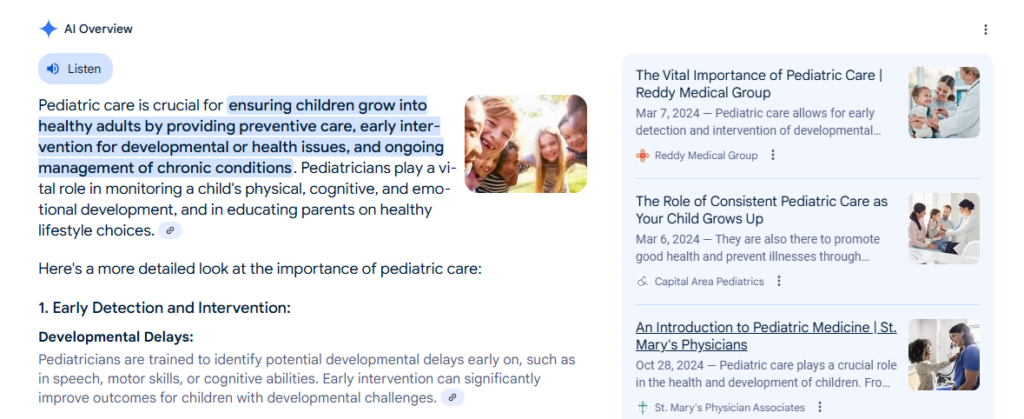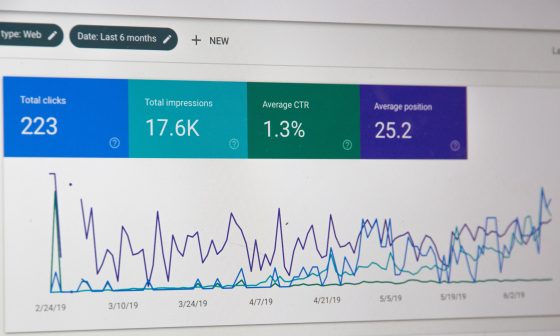Search is changing rapidly, and it’s no longer just about page one rankings. The rise of AI-generated answers, summaries, and conversational assistants like Google’s SGE (Search Generative Experience), ChatGPT, Bing Copilot, and Perplexity is reshaping how people find local businesses and turning the old SEO playbook upside down. Local businesses that previously relied on keywords and backlinks may suddenly find themselves invisible in AI-curated search results. The bottom line is that although online visibility was already a challenging game for local businesses, it’s likely to become even tougher.
This paradigm shift means that local businesses need to focus on local SEO for AI search and less on traditional SEO. Synup has helped hundreds of thousands of local, small, and medium-sized businesses with visibility and reputation powered by local SEO in the last decade.
Based on research and experience, we’ve seen that businesses seeking to appear in AI search require strong trust signals that AI systems can easily understand and cite. In simple terms, AI search ranking factors are primarily concerned with structured data, consistent brand signals, and recent customer feedback.
TL;DR
- AI-powered search (think Google SGE, ChatGPT, Bing Copilot) is changing how people find local businesses. The old playbook of cramming keywords and piling up backlinks isn’t enough anymore.
- To show up in AI-generated answers, businesses need strong “trust signals.” These include consistent NAP (Name, Address, Phone) data across all directories, fresh and positive reviews, and robust structured data (schema markup).
- Content freshness is a big deal. Updating service pages, adding new photos, and gathering regular reviews demonstrate that your business is thriving and continues to deliver value today. AI tools love this.
- Getting featured on reputable local news sites, industry blogs, and community directories builds authority. These third-party mentions act like public votes of confidence that AI algorithms notice.
- Conversational readiness matters too. Your website content should sound natural and answer real questions the way people speak, not just typed search queries. Think FAQs and helpful, human-focused service pages.
- Agencies and marketers who help local clients adapt to these AI-focused search signals will future-proof their visibility, keep them ahead of competitors, and make sure they’re not left behind when AI-generated search fully takes over.
What Do We Mean By AI Discoverability?
AI discoverability is the likelihood that your business will be mentioned, recommended, or highlighted in AI-generated answers. This goes far beyond classic search engine optimization. Instead of crawling for backlinks and stuffing keywords, AI engines lean on entity understanding and trust signals to decide who makes the cut.

Source: Google
AI discoverability today is more about whether AI systems can understand, trust, and confidently feature your business in their responses. Instead of scrolling through ten links, customers now expect instant, precise, and all-in-one-place results, more often curated by AI.
Let’s look at the instance where someone asks, “Best pediatricians near me” on the search engine. Traditional SEO would favor pages stuffed with “pediatrician near me” and stacked with backlinks. However, an AI model seeks entities with strong, up-to-date reviews, solid structured data, mentions in trusted local directories, and E.E.A.T. signals.



That’s not all. AI discoverability requires:
- Clean, rich, structured data (like schema markup) to help engines understand your services and location.
- Strong review recency & authority, which signals that real people trust you today, not five years ago.
- High topical relevance, proving you’re an expert in your field.
- Frequent presence in high-quality sources beyond your website.
Importantly, while there’s overlap, AI cares less about keyword cramming and more about real-world trust.
You’ll see this in:
- Google SGE, where AI-generated summaries cite businesses directly.
- ChatGPT plugins and tools, which pull verified, structured info.
- Bing Copilot, which prioritizes freshness and authority.
- Perplexity, Claude, Gemini, and other emerging AI systems.
Practical example: A clinic that updates reviews weekly and maintains updated NAP (name, address, phone) consistency will appear in AI results more often than a competitor stuck with testimonials last updated in 2021.
AI Discoverability vs Traditional SEO: What’s Changed?
Here’s a breakdown comparing traditional SEO signals to SEO powered by AI:

AI models don’t rank you purely by backlinks or how many times you used “best plumber in Austin.” Instead, they build a mental “entity graph” of your business (like a living knowledge card) and use structured trust signals to decide if they should recommend you.
With local SEO for AI search, you must think beyond the standard “rank and repeat” approach. It’s now about teaching AI who you are, what you do, and why you’re the most trustworthy choice.

Here’s what you can do right now:
- Set up structured data using schema.org markup for your business type, location, services, and reviews. Don’t skip rich snippets.
- Focus on review recency. Aim for 2 to 4 new reviews per month at minimum. More is better, especially for high-volume businesses.
- Get brand mentions in high-quality sources like reputable local news, community blogs, and local listings. Stay active.
- Maintain NAP consistency everywhere, most importantly on Google Business Profile, Yelp, local directories, and your own website.
- Update content regularly. AI values freshness, so make sure your pages aren’t stale.
- Adapt your tone for conversational relevance. Create FAQs, blog posts, and service pages that answer natural language questions clearly and helpfully.
Let’s get into what these mean.
Key Signals That Drive AI Discoverability
Website rankings and visibility metrics are being shaken by the rise of generative AI. Google AI Overview alone now appears in 50% of Google searches.
A lot of content marketers and SEO agency founders are now asking key questions: “How do I show up on AI search?” or “What are the new AI search ranking factors?”
The short answer: trust signals. To rank in AI search, your business needs strong, structured data, fresh reviews, authoritative citations, and content that sounds natural and helpful.
Structured Data & Schema Markup
Structured data is your brand’s digital DNA. It’s how AI systems “understand” what you do, where you are, and why they should trust you.
First, always include schemas such as LocalBusiness, Organization, Review, FAQ, and Services. This tells AI exactly what each page and service is about.

Take it further by using a service-level schema. For example, a dentist shouldn’t just mark up their main page. Each service page, like teeth whitening or root canals, should have its own structured data. This provides AI with more granularity, making your business appear more frequently in targeted, conversational searches.
Businesses using full schema markup see 30 percent more click-throughs from search. Now, that’s a stat worth framing on the office wall.
Review Recency & Sentiment
Reviews are no longer just social proof for human eyes. They are a core part of AI search ranking factors. AI systems scan reviews to check if a business is still active, relevant, and loved by customers today. Fresh, consistent reviews act as a living heartbeat for your business online.

Recency signals that your business hasn’t closed down or lost touch with its customers. Sentiment, on the other hand, shows quality. AI looks for emotionally rich testimonials that reveal what stood out for clients recently. One way to encourage this is by using trigger phrases when asking for feedback, like “What did you love most about your visit today?”
Also Read: 10 Clever Ways to Ask for Reviews
Remember, a stagnant review profile is like an empty shop window. Keep it lively and up-to-date.
Presence in Authoritative Sources
AI models heavily rely on public data from reviews, directories, and third-party sources to assess credibility. Showing up in places like Yelp, Apple Maps, niche industry blogs, local news outlets, and even Wikipedia improves trust. So, think of each listing or article as a micro vote of confidence.
If you manage multi-location businesses, syndicated data distribution, such as listing management, expands your visibility footprint. The more consistent and widespread your business data, the more likely AI is to recommend it.
Being present in authoritative sources boosts local SEO for AI search and also reassures real customers that you’re legitimate and active in your community.
Topical Authority in Content
Google’s AI prioritizes brands that display strong topical authority. That means your content needs to do more than list services; it must answer real, context-driven questions. Consider natural user questions, such as, “Can a chiropractor help with headaches?”
Content should be rich, well-structured, and optimized for E-E-A-T (Experience, Expertise, Authoritativeness, and Trustworthiness). Use service pages with detailed explanations and incorporate FAQs and “people also ask” style sections directly on your pages.


Doing this positions you as a source of truth, not just another service provider. It helps AI confidently pull your business into top recommendations.
Conversational Readiness
AI-powered tools thrive on natural, question-and-answer-style language. Your business needs to be prepared to engage in these new conversational queries. If your content is robotic or too formal, you’ll get ignored.
A quick self-test: ask ChatGPT, Perplexity, or Bing Copilot about your service category in your area. See if your business pops up. If it doesn’t, your content might lack conversational cues or trust signals.
Including detailed service breakdowns and natural language descriptions helps your content sound human.
Optimise for Voice Search
It’s easy to forget the large population of customers who simply shoot a question at Siri, Google, or their Echo before then being given the answers most optimized for Voice Search.
Voice search queries are distinctly local and context-driven. Try to use long-tail, question-style phrases that best match spoken language patterns in addition to other best practices such as NAP consistency, high-quality images, and alt. text.
Future-Proofing Your Clients for AI Search
Even if AI search tools like Google SGE and AI Overviews are still in their early stages, they’re evolving rapidly. The foundational signals they use are already impacting search visibility.
Businesses need to act now by creating what we call “source of truth” content. This means content that is:
- Accurate and factual.
- Updated regularly to reflect changes in services, pricing, or brand information.
- Written in natural language that matches how people ask questions.
Prepare your site for voice-style queries. Think about how people speak rather than how they type. Optimize your service pages and FAQs to provide direct, structured answers.
Here’s a simple action plan to get started on that:
- Audit your current content and remove outdated information.
- Implement or update all schema markups.
- Collect and publish new reviews consistently.
- Expand your presence in trusted directories and local news sources.
- Rewrite service pages to answer conversational questions directly.
How Review Recency Affects Trust and Conversions
Review recency is one of the clearest signals AI models pick up when determining if a local business deserves to rank higher. Customers instinctively glance at the date before reading a review. Even perfect five-star ratings from years ago make a business look out of touch or dormant.
For businesses in fast-changing sectors like healthcare, food and beverage, or retail, recency can make or break your local SEO and trust from prospects who are finding you for the first time. AI models, especially those powering local SEO for AI search, prioritize businesses that show ongoing engagement and recent proof of service quality. Phrases like “just had a great visit” or “still amazing in 2025” instantly build credibility and tell AI that this business remains active and reliable.
If you want to maintain fresh signals, train your team to ask for reviews at checkout, automate review requests post-visit, and publicly respond to every review, good or bad. Fresh reviews won’t just sway humans; they’ll push your client’s business up in AI search ranking factors, increasing the chances to show up on AI search consistently.
Conclusion
The takeaway is simple. AI discoverability is a competitive edge for businesses and not a threat. Clients who want to appear in AI search results and stay ahead must adapt to new AI search ranking factors. The old days of keyword stuffing are over. The winners will be those who create transparent, structured, and deeply helpful content that AI can understand and trust.
If you want your clients to thrive in local SEO for AI search, start making these moves today. Agencies that guide local clients through this shift will win visibility. You’ll help them stay visible not only on page one but also in the fast-growing world of AI-driven search experiences.
Improve AI Discoverability for Local Business Clients: FAQs
How can AI improve the efficiency of small business owners?
First, AI-driven tools can help small businesses automate repetitive tasks. For instance, Synup assists with scheduling social posts, generating review replies, and analyzing customer sentiment. AI can also help with insights from large data sets you’d otherwise need a whole analytics team to sift through. You get plain-language summaries of trends, customer preferences, and reputation signals in seconds. When you automate parts of your processes with AI, you can reclaim hours every week, making it easy to scale without a lengthy payroll.
Why is content freshness vital for AI search?
If your website hasn’t been touched in ages, search engines (and AI tools) pretty much assume you’ve closed shop. Fresh content is a big green light that you’re still serving and still relevant. It could be as simple as new photos, updated service details, or a few fresh customer reviews. Keeping things up to date informs Google and other AI-driven platforms that your business is credible and deserves to be seen. It’s like keeping your shopfront clean and welcoming. Nobody wants to walk into a dusty store with a “back soon” sign from 2018.
How can AI help manage your business reputation?
AI reputation management tools, like Synup, can monitor what people are saying about you online, whether it’s good or bad. It can spot patterns, flag complaints early, and even help you ask happy customers for reviews without coming across as pushy. It’s like having a mate who’s always listening out for gossip so you can sort things before they blow up.


